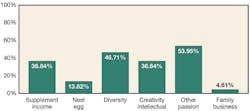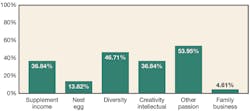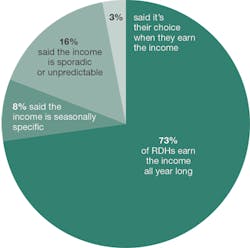Dental hygienists’ Gig Economy
An inside peek to adding bottom-line value
By Anne Guignon, MPH, RDH, CSP
Creating and sustaining a viable alternative income stream is not a new idea. What are the driving forces for hygienists who work outside of a clinical setting, and how do those forces contribute to their financial health? In July 2018, 152 dental hygienists shared their thoughts in a short anecdotal poll (figure 1). The results painted a very colorful, diverse, and intriguing picture.
Figure 1. Motivations for nonclinical positions
Motivating factors
Dental hygienists are resourceful. Those who seek additional income are creative, inspired, and unwilling to let anyone define where and how they’ll make those extra dollars. Their enjoyment of something was their number one driver as more than half of the respondents said they earn income doing work they truly enjoy. Diversity was high on the list, and many said the nonclinical work feeds their creativity or provides an intellectual challenge.
Surprisingly, money was not the primary driver, but it was an important aspect for one-third of the respondents. Fourteen percent said they are building a nest egg, and just under 5% reported working in a nondental family business.
The poll revealed some surprising paths to pad RDHs’ bottom lines. Some split their time between a previous occupation and clinical practice, while others made a complete career shift. Sadly, a number said their job changes were spurred on by the physical toll of dental hygiene practice through the years.
When clinical hygienists look at alternative income sources, the most common positions they consider are teaching in a dental hygiene program or working in corporate education, sales, or marketing. These positions typically require a master’s degree or enrollment in a program that leads to a higher academic degree. These positions follow a more traditional structure in terms of work hours and environment, and can be either full or part time.
The internet is full of chatter about how to create a viable income that can replace clinical hygiene income without the need for an additional degree. Many offers are based on a multilevel marketing business model that involves direct sales of health and beauty products, clothing and accessories, household products, or lifestyle coaching.
Another approach is to work part time as a brand ambassador or a clinical educator for a product or technology. The company typically has certain guidelines, but generally individual workers control when they work and how many hours they devote to the position.
Surprising alternatives
Respondents shared many details about the diverse ways they earn additional income. The range of occupations may surprise you.
Creative arts: Food, photography, and handmade items
Lisa owns a wedding decorating and custom accessories business. Brooke is a busy baker who creates intricate theme cakes.Valeria in North Carolina is a licensed baker and cake decorator who “makes cakes, cookies, candied apples, candied popcorn, and pretty much everything bad for the teeth,” she said. Rebecca also decorates cakes and specializes in gingerbread houses and cookies that she sells at holiday craft fairs.
Deb studied embroidery in Japan, so she lectures on Asian textiles and teaches classes in Japanese silk embroidery. Morgan also does embroidery and loves the work because “I can do as much or as little as I want.” Malinda does custom crocheting and loves the fact that she can do this during her downtime. Briana likes creating knitted items that have practical uses. Another RDH works as a costume maker and seamstress and applies theater makeup. Tina creates handmade jewelry, handbags, and does upholstery.
Many make jewelry and do metalwork. One even owns her own iron casting service and loves the freedom to stop working in the studio when her hands hurt.
Cindy is an artist and displays her paintings at a gallery. Another works as a graphic designer. Jill in Florida owns a screen-printing business that creates customized T-shirts for businesses and sports teams. “It’s a fun side job that keeps my creativity going,” she said.
Social support: From weddings to dog walking to cleaning
One hygienist does babysitting, and another walks dogs and occasionally works as a dog sitter. She started out with a friend’s dog and now takes care of various dogs.
A remarkable number of hygienists love cleaning other people’s houses and even dental offices. Kendra likes it because “It is nice and quiet and no one bothers me.” Wendy likes cleaning her friend’s huge home, and Keeley provides housekeeping support for her parents. Tracy cleaned houses and did auto detailing when she was in school, but quips, “Don’t look at my house or car.” Elaine’s cleaning takes a different twist—she cleans another dentist’s office. Anne cleans vacation cottages and weeds lawns in the summer, and another hygienist loves being outdoors so she specializes in lawn care.
Spurred on by her child’s needs, one hygienist works as the director for a nonprofit support group for parents of children who are deaf or hard of hearing. Laura started an online nanny service that provides personalized helpfor nannies looking for positions and families seeking nannies. Her company offers background checks, payroll services, contracts, and last-minute sitter connections.
Bettina plans people’s weddings, Megan photographs them, and Akta does wedding draping for the saris and outfits worn in Indian weddings. She makes sure the long fabrics are draped and pleated so that everyone looks uniform and fitted.
Travel and leisure: Want to get away?
Lisa works as a flight attendant, and Melanie works as an aviation maintenance mechanic. Stephanie works at the front desk of a luxury hotel in Florida, while Whitney drives for Uber in Mississippi. Erin and several other RDHs work as travel agents; Erin specializes in Disney destinations.
April has served as the manager of a beach house in Mexico since she was in school. She spends her day organizing the calendars and updating the website as well as coordinating maintenance and dealing with homeowner association tasks. Others also manage vacation rentals, and one even has her own home listed on Airbnb, which she says is easy to do and encourages her to keep her house clean.
Family business: Working together
Melissa and her husband own a small trucking company. She juggles the accounting, dispatching, and daily business activities, while working in temp hygiene a couple of days a week. Another hygienist works as an electrical contractor in the family business. Julie’s family business iswindow cleaning, and she enjoys interacting with many of the company’s elderly and retired clients. Crystal does the bookkeeping and payroll for her husband’s auto repair shop. “I love budgets and finance,” she said.
Jamie works as a rancher on Colorado’s western slope, and another hygienist helps her dad make custom cowboy stirrups out of oak. She loves creating something functional from a piece of wood, but more importantly, she loves helping her father.
Gina’s family raises beef cattle and owns and operates an RV resort in the Texas hill country. Emily farms corn and soybeans with her husband in Iowa and oversees the buying and selling of their seed crops, purchases crop insurance, and if necessary, can operate every piece of heavy farming equipment.
Recreation and fitness: From horses to coaching to water sports
Janet started training and exercising horses after her horse died. She knew someone who had a horse but no time to care for it properly. Another teaches horseback riding. Vicky in Georgia uses horseback riding to help others overcome their fears and challenges.
Many hygienists are involved in some kind of exercise or gym activity. These include teaching yoga, Pilates, swimming, water fitness, stretching, and group fitness. One Pilates instructor said, “It keeps me active and my neck and back healthy, and it’s a great way to unwind and have fun.”
Madison loves teaching gymnastics, Amy focuses on dance, and Suzanne in South Carolina teaches spin classes three times a week. Karen in Colorado enjoys how fitness and exercise make her feel, and how the physical activity helps her avoid burnout. Candi works as an assistant flag football coach, while another coaches cheerleading.
Nondental health care: From humans to animals
Pam works at the registration desk of a hospital emergency room. While the pay is 50% of her hygiene salary, she qualifies for family insurance that costs $500 a month. Another hygienist enjoys the respect she receives when she works as a receptionist in an endodontic practice.
Hygienists also work as licensed acupuncturists and massage therapists.Leslie has been doing massage therapy for 13 years. She uses essential oils, and her work ranges from relaxing to firm. Beth loves healing people through myofunctional therapy. Amy and others work as emergency medical technicians.
Donna earned her master’s in social work and now works in a hospice organization assisting family members process an upcoming death. Julie, who has a master’s in counseling psychology, spends half of her time working as a marriage and family therapist at a local university or in private practice. Many hygienists are also registered nurses. Some work in elementary or secondary schools, while others work in hospital settings. Dawn works part-time in a medical weight-loss practice.
Several are dental lab technicians who own their own labs. They love helping people replace missing teeth and create beautiful smiles. Cappy in Texas uses her skills in permanent makeup to create areola tattoos for women after breast reconstruction.
Cyndi and Tammy are veterinary technicians. Tammy divides her time between humans and animals and has worked in the same office for several years. Cyndi in Arizona focuses on providing quality dental care for animals. She feels appreciated by both the veterinarian she works for and the animal owners.
Health-care administration: Getting the job done
Jennifer is the dental director of a federally qualified health center. She oversees dental grants and is the dental analyst for a managed care organization in Kentucky. Melissa is the director of a state mobile dental program in Oregon and feels respected as a health-care leader. Helen is the director of the Pennsylvania oral health coalition, a position thatallows her to help people at the population level as opposed to a personal level. Elva works with a Medicaid program two to three hours a day. She interacts with parents via the phone to schedule their children’s dental appointments, provide nutritional counseling, and educate them about the benefits of sealants.
Colleen works as the personnel coordinator of a dental temp agency in Massachusetts. Emily uses her hygiene knowledge in her position as the office relations and marketing coordinator for an Ohio periodontist. This keeps her involved in dentistry without the stress of clinical work.One wrote that she believes dental hygienists are ideal office managers “...because we know the back and understand the entire office.” Pat in Florida earns “mad money” by sharpening instruments.Annette specializes in bookkeeping for dental offices in Jacksonville, while Melissa in Philadelphia does billing for dental offices.
One hygienist reviews the treatment plans submitted for those who have dental needs due to workplace injuries. She enjoys explaining treatment plans so clients can understand the need for the proposed treatment. Another RDH works as an insurance fraud investigator, while Sharly is a medical records coder for an internal medicine clinic, and trains and audits providers. She loves the benefit package as well as the reduction of physical stress.
Education: An essential part of every hygienist’s DNA
It was not surprising to learn that many RDHs gravitate to the formal academic world for both dental hygiene and dental assisting. Others work as corporate clinical educators, as well as teach CPR, board review courses, and various technologies such as cone beam CT scanning and digital x-rays. Jeanette is a dental laser instructor. Millie and Ann-Marie work as technology advisors for a large dental supply group.
Tracy founded a study club business that has grown to include multiple groups that offer CE opportunities in the Atlanta metro area. Some RDHs are substitute teachers in either the primary or secondary setting. Roxanne, one of the two respondents who teach online English as a second language, says it is “super fun.” Another hygienist is the director of religious education at her parish and is responsible for recruiting other RE teachers and preparing the annual education budget.
The educators thrive on their students’ lightbulb moments and sharing their love of education. Cheryl delights in passing along 33 years of clinical experience with her students. Christian knows that he’s able to teach in Michigan valuable techniques that students may not be exposed to in a more formal situation.
Arts, entertainment, and adventures: The wild card category
Shayla works at AT&T stadium selling programs at the Cowboy football games in Dallas. “It’s fun and pays well,” she said. Ryan works as a DJ for parties, and Jennifer is a DJ at her local National Public Radio station.
Debora has been a fashion model for many years and now organizes fashion shows in conjunction with health-care conferences. Justine shares her love of Irish dance by teaching others the dance. Karen works as a crossing guard for an area police department. Bonnie owns several vape shops and her goal is to help people quit smoking. Julie loves the self-discovery of astrology.
Sales and marketing: What we like to do
Many hygienists are involved in direct sales and marketing of skin-care products, cosmetics, nutritional supplements, toothpaste, essential oils, power brushes, and personal and lifestyle coaching. Lucy loves the change of pace this brings. “It doesn’t feel like work and I’m not physically drained at the end of the day.”
RDHs are well equipped to be involved in activities such as selling dental implants. Michele focuses on magnification loupes, auxiliary headlights, and saddle seating, while Sherry sells an electronic caregiver safety alert device that helps people live in their homes longer.
Cathy in Georgia spends her extra time buying and selling antiques, another Oral Health Coalition RDH works as a vendor for a produce farmer, and Elisheba works as a licensed insurance broker who provides coverage for life, health, dental, and accidents, as well as annuities.
Fueled by her experience of poor fit and lack of quality in scrubs and lab coats, Debora designed a high-quality line that offers fashion and comfort. Her uniforms are made in New Jersey and use all US-made components. Jodi owns a trophy and embroidery business.
Real estate sales, investment properties, construction
Linda and Candi are landlords, while Danielle and others focus their energies on real estate sales. Tosha and her family flip houses. Her three young sons enjoy the demolition, and Tosha loves the design aspect. “It’s awesome taking something that’s ugly and making it a wow.”
Consultant: Professional speakers, writers, career coaches
Many seasoned hygienists want to share what they’ve learned. Sharon spent years in education and was the director of two different programs. She now provides consulting services in the dental hygiene education community. Another hygienist manages oral health outreach efforts for an insurance company. She creates educational materials, conducts seminars and training sessions, and reaches out to other health-care disciplines. Jasmin is a speaker, coach, and seminar host who has a membership site for hygienists who want to take a deep dive into career opportunities.
Beauty salon: Always an eye on the looks
A number of hygienists have a presence in the beauty industry where they work as licensed hairstylists, estheticians, and nail technicians. Ha Chu divides her workweek working 24 hours in clinical and 16 hours in a nail salon, and she loves the monetary tips she receives from salon customers.
Retail: Food, glorious food
Ann owns a kettle corn company, selling the goodies at local festivals and events. She is growing her business with the goal of transitioning to it full time after spending many years in clinical hygiene. Deb has worked for years at a hometown pizza establishment in New Hampshire. She admires the owner for donating and giving back to the community. One hygienist works in a submarine sandwich shop 15 hours a week. Heather Jo works as a manager-bartender at a craft beer bar, and Alexandra bartends every other weekend.
Susan splits her week between clinical hygiene and a grocery store that has a new curbside department. She shops for customers, who then drive through to pick up their orders. She says, “It’s really fun, but it involves a lot of walking.”
Morgan works in a children’s clothing boutique.
Additional thoughts
Close to three-quarters of the side jobs are nonclinical positions that generate income for RDHs throughout the year, indicating that these income streams are a serious part of the respondents’ overall financial health (figure 2). Nearly two-thirds of the positions did not require additional licensure credentials, which made securing additional income simpler. The remaining occupations required additional education, specific certifications or registrations, continuing education courses, or approval from a state agency.
Figure 2. How RDHs distribute
additional income throughout the year
Ideas are great, but some are just ideas. Can your ideas put dollars in your bank account while also feeding your creative soul? The answer is yes! The secret is finding ways to make your ideas actionable and profitable. That’s the hard part, but if you’re serious, you can do it.
Anne Nugent Guignon, MPH, RDH, CSP, provides popular programs, including topics on biofilms, power-driven scaling, ergonomics, hypersensitivity, and remineralization. Recipient of the 2004 Mentor of the Year Award and the 2009 ADHA Irene Newman Award, Anne has practiced clinical dental hygiene in Houston since 1971 and can be contacted at [email protected].


